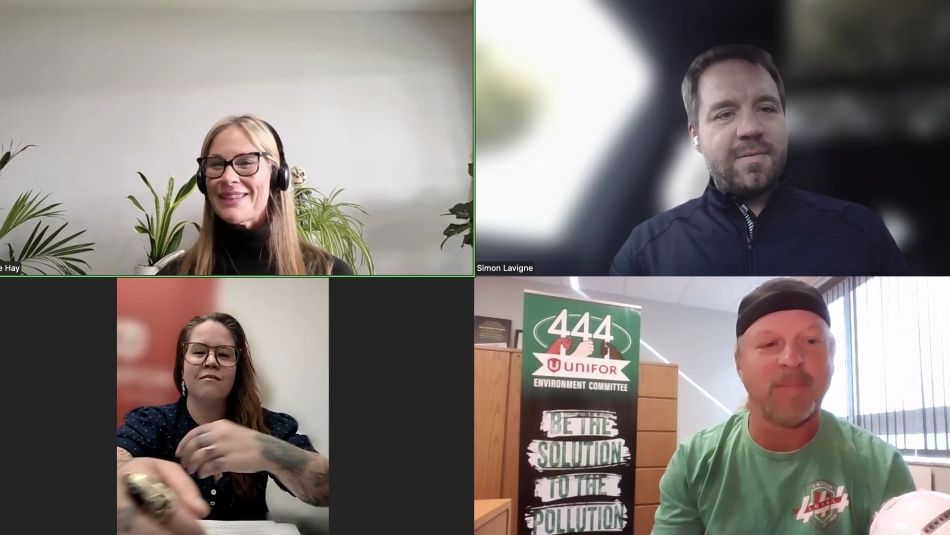
Share
Unifor activists participated in a two-day online webinar titled “Courageous Voices For a Just Transition” to learn more about the state of the climate crisis in Canada and abroad, and share local stories about how union members are taking matters into their own hands.
The webinar began on October 31 with a welcome from Unifor Health Safety and Environment Director Joanne Hay, followed by remarks from National Secretary-Treasurer Len Poirer.
“The world of work is evolving, and our union has a role to play. Unifor is a visionary union; we plan, we fight. This conference is an important, integral part of our on-going and future activities to ensure sustainable work in a transforming environment,” said Poirier.
Angelo DiCaro, Unifor Director of Research, used case studies to review how industrial policies can shape a vision for the future, and how governments past failures to lead have hurt Canadian workers and industries.
Patrick Rondeau of the Quebec Federation of Labour in dialogue with Unifor’s Simon Lavigne briefed participants on labour’s climate organizing in Quebec, including recent victories, current challenges and the path forward.
Sarah Henderson from the Environmental Health Services at the BC Centre for Disease Control tackled how heat stress is a growing concern as record high temperatures are more commonplace in most regions. Providing valuable recommendations on what we need to do and change to protect human lives both indoors and outdoors.
Unifor members Gabrielle Scott and Rick Labonte introduced their climate justice work at the local and led a discussion about how to mobilize in the workplace and in the community to build bridges with other activists.
To close the first day of the conference, forest ecology research scientist Yan Boulanger shared the latest data on wildfires around the globe and the relationship between CO2, droughts, and the fires that threaten livelihoods in the short term but also accelerate carbon emissions in the long term.
Day two of Courageous Voices began with an international case study about the work being done in Bangladesh by Chowdhury Repon of the Secretary General of the Bangladesh Free Trade Union Congress. He helped provide a sobering perspective on some of the struggles in the so-called Global South and the urgent need to unite internationally to ensure all workers voices are heard.
Former CEP staff and retired Director of Health, Safety, and Sustainability for IndustriALL Brian Kohler joined the online conference to discuss the history of the concept of Just Transition and the slow progress that has been made in the fight to get workers on the agenda of global climate change talks.
Kohler’s remarks were followed by a conversation about the financial levers that could benefit the just transition campaign led by Julie Segal, leader of Environmental Defence’s Climate Policy Program. From pension funds, to stranded assets, to personal financial risk, climate change impacts finances at every level.
The conference ended with a roadmap for worker-led change presented by Unifor National Researcher Sune Sandbeck. He emphasized that without workers, the transition cannot be fair nor successful. To help add structure to the challenge, he sketched out six paths to action: Local Stakeholder, Environmental Committee, Ecological Projects & Initiatives, Awareness & Training Activities, Joint Environmental Committee, Bargaining Language.


